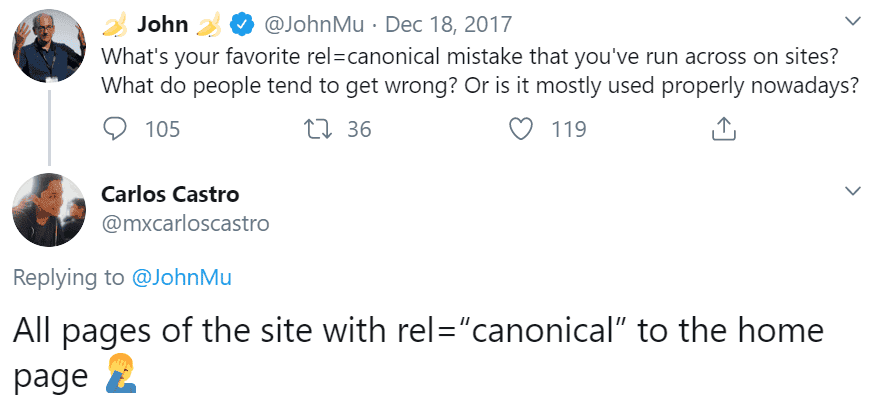Canonical points to homepage
This means that the URL in question has a canonical element which points to the homepage URL.
Why is this important?
In and of itself, there is nothing wrong with having a canonical which points to the homepage. For example on this site, we have a parametrised version of the homepage https://sitebulb.com/?producthunt which we used for our initial launch, and the canonical on this URL is set to the homepage.
When this becomes an issue is when LOTS of pages link to the homepage, as this typically indicates some sort of error, which may then lead to indexing issues.

What does the Hint check?
This Hint will trigger for any internal URL which contains a canonical link element that uses the homepage as the canonical URL.
Examples that trigger this Hint:
Consider the URL: https://example.com/page-a
The Hint would trigger for this URL if it had a canonical URL pointing at the homepage:
<link rel="canonical" href="https://example.com" />Why is this Hint marked 'Potential Issue'?
This Hint is a 'Potential Issue' because, depending on the situation, it might not be an issue at all - for example the https://sitebulb.com/?producthunt example mentioned above.
The canonical tag is meant to be used for pages that are an exact duplicate, as a way of saying to search engines 'hey I know these pages are duplicates, and this is the one I want you to consider for indexing purposes.'
So this only becomes an actual issue when pages that are not duplicates of the homepage are canonicalised to it. And if this is happening on a large number of URLs, it is most likely some sort of accidental configuration error.
To resolve it, you may need developer help, as you will need to adjust page templates, plugins or HTTP headers - removing or correcting the canonical tag so that it is either self-referencing, or pointing to a genuine duplicate.
 Sitebulb Desktop
Sitebulb Desktop
Find, fix and communicate technical issues with easy visuals, in-depth insights, & prioritized recommendations across 300+ SEO issues.
- Ideal for SEO professionals, consultants & marketing agencies.
 Sitebulb Cloud
Sitebulb Cloud
Get all the capability of Sitebulb Desktop, accessible via your web browser. Crawl at scale without project, crawl credit, or machine limits.
- Perfect for collaboration, remote teams & extreme scale.
